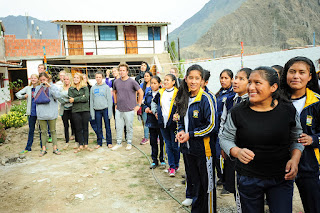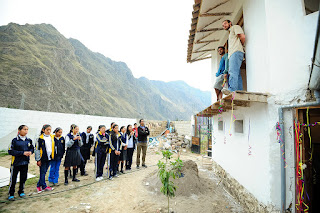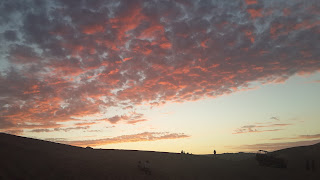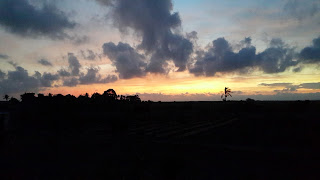While in Peru, I spent some time volunteering at The Sacred Valley Project, a non-profit organisation, in Ollantaytambo. This project was started, because there was a need for accommodation, educational resources and meals for young girls, who were in danger of being raped and abducted on their long journeys to school. The Sacred Valley Project provides about 16 girls with a safe space and they don't have to walk hours from their remote, mountain communities to school every day.
Unfortunately, the girls only have 2 small bathrooms, so, we built them another one while we there and also painted their walls. The new bathroom will have 3 new showers, one new toilet and a big sink, and there will be room for more than person at a time. We met each girl, learnt their names, played games with them and even got to help them with their homework, so, this project has a special place in my heart.
 |
| The Sacred Valley |
At the inauguration of the girls' bathroom, we hung a bottle of champagne from the door frame and Rolando, our leader, broke it - which is seen as a blessing of the bathroom, and always used to be done with chicha, a local drink of fermented corn. It was really sweet; one of the girls said a few words and they were so appreciative. After that we said our goodbyes and hugged each other and the cook, who also said a few words, went around hugging each one of us and putting confetti in our hair. Nayda, one of the girls, shyly approached me and thanked me for helping her with her English homework.
The Sacred Valley Project is important, because it is ensuring that young, indigenous girls in Peru have the right to education and equal opportunities to boys from the same communities.
You can learn more about the project on their website: http://sacredvalleyproject.org/
It's Christmas tomorrow and in the spirit of giving, I decided to start a fundraising page for the Sacred Valley Project. Any donation, big or small, will go a long way toward improving the educational prospects for these Peruvian girls. If you can't make a donation at this point, help me reach my goal by sharing the link to my page on Facebook and Twitter! Or, even better, send an e-mail to friends you think might be interested in contributing and include a link to my page! Here's the link: https://impact.rusticpathways.org/fundraise?fcid=581090
Photo credit: Rustic Pathways
















































